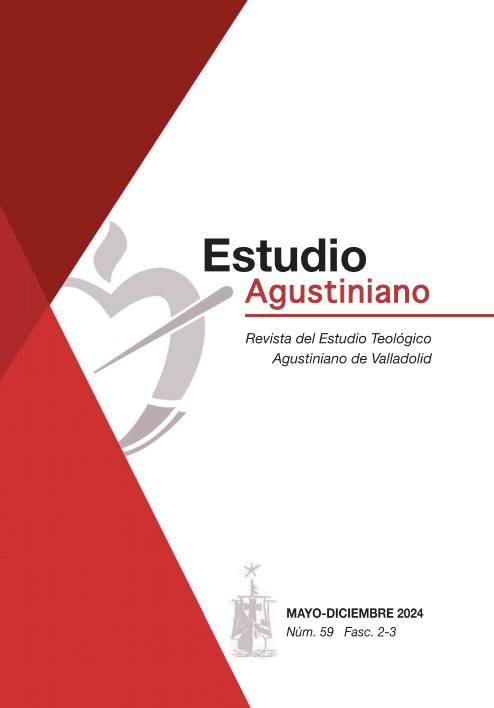"Blessed is he who reads and listens to the Words of this Prophecy..." (Ap 1:3). The Importance of Public Reading of Scripture
DOI:
https://doi.org/10.53111/ea.v59i2-3.1159Keywords:
Oral Tradition, Performative Criticism, Origins of Christianity, Reading Communities, Reader, Proclamation of the WordAbstract
On the occasion of the institution fo lay ministry of reader by Pope Francis, the article wants to expose the value of the proclamation of the Word of God as a means to access faith and as an effective way to consolidate the lives of believers. Firslty, this work briefly exposes the value an necessity of the human word an the word of God in the lives of the people. Next, it studies, within the context of antiquity, how the reading of sacred texts at the origins of Christiantiy was an effective means of this expansion and consolidation. It ends this modest contribution by underlining the importance of the proclamation of the word today in the Church.
References
Chapa, Juan (2017). «¿Qué texto? Pluralidad textual y ediciones críticas» en Santiago, Guijarro, La interpretación de la Biblia (XLVII Jornadas de la Facultad de teología de la UPSA), Madrid, PPC, 69-95.
Culpepper, Ralph Alan (1996). Anatomy of the Fourth Gospel: A Study in Literary Design, Philadelphia, Fortress Press.
Rhoads, Davis – Dewey, Joana (2014). «Performance Criticism a Paradigm Shift in New Testament Studies», en Kelly Iverson (ed.), From Text Performance Criticims in Dialogue and Debate, Oregon, Cascade Books, 10-21. DOI: https://doi.org/10.2307/j.ctt1cgdwmg.6
Del Olmo, G (2010). Origen y persistencia del judaísmo, Estella, Verbo Divino.
Esquirol, José María (2015). La resistencia íntima. Ensayo de una filosofía de la proximidad, Barcelona Acantilado.
García, Aurelio (2023). «Sacrosanctum Concilium» en Madrigal, Santiago, Comentario Teológico a los documentos del Vaticano II, BAC, Madrid 2023: 71-392.
Gesché, A (2002). El hombre. Dios para pensar II (Verdad e Imagen 153), Salamanca 2002.
Guijarro, Santiago (2022). «‹Entienda el que lea› (Mc 13,14). Comunidades lectoras en los inicios del cristianismo», Cauriensia, vol.III (2022): 761-783. DOI: https://doi.org/10.17398/2340-4256.17.761
Guijarro, Santiago (2023). La memoria viva de Jesús. Dinámicas de la transmisión oral, Salamanca, Sígueme.
Hearon, Holly (2011). «From Narrative to Performance: Methodological Considerations and Interpretive Moves» en Hearon Holly – Kelly Iverson, Mark as Story: Retrospect and Prospect (Resources for Biblical Study65), Atlanta, Society Biblical Literature: 211-232.
Hernández Carracedo, José Manuel (2020). La caracterización de Jesús en las notas del narrador del evangelio de Juan. Una guía de lectura para el relato (Monografías Bíblicas 78), Estella, Verbo Divino.
Hernández Carracedo, José Manuel (2024). «Las notas del narrador en el evangelio de Juan: un testimonio de la tradición oral» en Revué Biblique, 3: 393-412.
Hurtado, Larry (2010). Los primitivos pápiros cristianos. Un estudio de los primeros testimonios materiales del movimiento de Jesús (Biblioteca de Estudios Bíblicos 133, Salamanca, Sígueme.
Hurtado, Larry (2014). «Oral Fixation and New Testament Studies? ‘Orality’, ‘Performance’ and Reading Texts in Early Christianity» en New Testamente Studies, 60: 321-340. DOI: https://doi.org/10.1017/S0028688514000058
Keith, Charles (2023), El evangelio como manuscrito. Dinámicas de la tradición escrita, Salamanca, Sígueme.
Kelber, Werner H (2013). Imprints, Voiceprints, and Footprints of Memory, Atlanta, Society Biblical Literature. DOI: https://doi.org/10.2307/j.ctt5hjh34
Marguerat, Daniel - Bourquin Yves (2000). Cómo leer los relatos bíblicos. Iniciación al análisis narrativo (Presencia Teológica 106), Santander, Sal Terrae.
Porter Stanley E. - T. Ong Hughson (2014). «Memory, Orality and the Fourth Gospel» en Journal for the Study 12 (2014): 143-164. DOI: https://doi.org/10.1163/17455197-01202004
Rhoads, D - Dewey, J. (2014). «Performance Criticism a Paradigm Shift in New Testament Studies», en Kelly IVERSON (ed.), From Text Performance Criticims in Dialogue and Debate, Oregon, Cascade Books: 2014, 10-21.
Schürer, Emil (1985), Historia del pueblo judío en tiempos de Jesús. Instituciones políticas y religiosas, Madrid, Cristiandad.
Ska, Jean Louis (2003), Los enigmas del pasado. Historia de Israel y relato bíblico, Estella, Verbo Divino.
Vanhoye, Albert (2005). «La recepción en la Iglesia de la constitución dogmática Dei Verbum» en Sanchez-Navarro, Luis- Granados, Carlos, Escritura y Tradición, Madrid, Ediciones Palabra: 147-173.
Vide, Vicente (2017). «Revelación: lenguaje y acontecimiento: La revelación por palabras y hechos» en Del Agua, Agustín Revelación, Tradición y Escritura. A los cincuenta años de la Dei Verbum, Madrid, BAC: 31-34.
Von Rad, Gerhard (1993), Teología del Antiguo Testamento I (Biblioteca de Estudios Bíblicos 11), Salamanca.
Johnson, William A. (2000). «Toward a Sociology of Reading in Classical Antiquity Author(s)» en The American Journal of Philology, Vol. 121, No. 4: 593-627 DOI: https://doi.org/10.1353/ajp.2000.0053
Zumstein, Jean (2016). El evangelio según Juan (13-21) (Biblioteca de Estudios Bíblicos 153), Salamanca, Sígueme.
Zumstein, Jean (2003). «La naissance de la notion d’Ècriture dans la littérature Johannique», en J.-M. Auwers - H. J. de Jonge (eds.), The Biblical Canons (Bibliotheca Ephemeridum Theologicarum Lovaniensium 163), Leuven: 371-394.
Downloads
Published
Issue
Section
License
Copyright (c) 2024 Dr. José Manuel Hernández Carracedo

This work is licensed under a Creative Commons Attribution-NonCommercial-NoDerivatives 4.0 International License.




